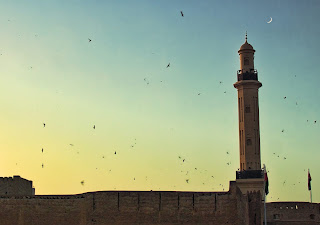Muslims celebrate two Eids each year - Eid al-Fitr and Eid al-Adha. Both are considered happy and "holy" days. Both are days of rejoicing and prayer.
The month of Shawwal is announcing the arrival of Eid-ul-Fitr. This is the end of Ramadan, the holy month of fasting. The next morning, the Muslims gathered in a large Thanksgiving party. He is thankful to Allah Almighty for giving him the opportunity and strength to observe the holy fast. They ask him to forgive them for their weaknesses and sins. They reaffirm their pledge of allegiance to God.
 The evening when the moon is expected to come is a memorable evening. As the sun sets, the faithful break their fast and offer a half-west. They run on the roofs of their houses and go in search of Shawwal moon. They look to the western horizon. There are several people at the top of each house, all scanning the sky with deep, anticipated eyes.
The evening when the moon is expected to come is a memorable evening. As the sun sets, the faithful break their fast and offer a half-west. They run on the roofs of their houses and go in search of Shawwal moon. They look to the western horizon. There are several people at the top of each house, all scanning the sky with deep, anticipated eyes.  After the sighting of the Shawwal moon, people raise their hands in prayers. Children are especially fond of seeing the Eid moon. When they see this, their faces usually light up with happiness. Dinner is eaten in a cheerful mood and plans are made for the next few days. What everyone wears and what the food menu will be. Many people hit the streets to get to their loved ones if they live in another city. Women especially go to the bazaars to buy bangles and Eid feature "henna or henna". Various food stalls are set up immediately and there is a happy atmosphere everywhere.
After the sighting of the Shawwal moon, people raise their hands in prayers. Children are especially fond of seeing the Eid moon. When they see this, their faces usually light up with happiness. Dinner is eaten in a cheerful mood and plans are made for the next few days. What everyone wears and what the food menu will be. Many people hit the streets to get to their loved ones if they live in another city. Women especially go to the bazaars to buy bangles and Eid feature "henna or henna". Various food stalls are set up immediately and there is a happy atmosphere everywhere.
The moon of Eid-ul-Adha is Zej Hujra. This festival is celebrated ten days after the appearance of the moon. It commemorates the sacrifice of Ishmael by his father Abraham. God told Abraham to sacrifice his only son for her. Abraham gladly stabbed his son in the neck but Allah saved Ishmael and by a miracle Ishmael was replaced by the sheep. Abraham and Ishmael stood the test of loyalty.
On the occasion of Eid-ul-Adha, Muslims sacrifice sheep, cows or camels. This is a busy, happy and memorable day for all.
The Muslim community is ready to celebrate the end of the month of Ramadan with collective prayers and various festivals. Ramadan is the month of the Islamic lunar calendar during which Muslims abstain from food, drink and other sexual pleasures from sunrise to sunset. The end of Ramadan marks the beginning of the three-day Eid al-Fitr or "break the fast" holiday, in which Muslims exchange social visits and seek to strengthen brotherhood in society. They celebrate a happy occasion with thanksgiving, good food, new clothes, gifts, and all the other festive prayers. Eid-ul-Fitr is not being celebrated because the month of Ramadan has ended, but thanks to God for obeying the commandments in the holy month.
Eid is an exciting time for Muslims. Before Eid prayers, Muslims give some money to the poor. It is a reminder that fasting has taught them more about the needs of others. Then they go to mosques for Eid prayers. After that most people meet family and friends where they will exchange gifts, share sweets and enjoy time together. Most Muslim communities will have an Eid dinner after dinner to get people together. The festivities continue for a few more days, sometimes until the end of next week.
During this holiday, Muslims give each other the meaning of "Eid Mubarak" which means "Happy Eid," and "Taqbala Allah Ta'alaikum" or "May God accept your deeds". It is a time to reflect on the past month, to be happy to have a month of fasting and worship, and to hope that one's deeds have earned the Lord's pleasure.


Comments
Post a Comment